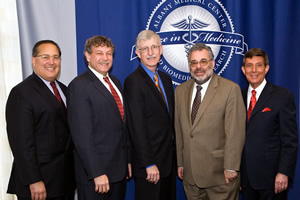Last updated: March 14, 2014
Genome Pioneers Share Albany Prize, \"America's Nobel\"
Genome Pioneers Share Albany Prize, "America's Nobel"
 |
A celebration at the Albany Medical Center in Albany, N.Y. on April 23, 2010, honored the pioneering contributions of National Institutes of Health Director Francis S. Collins, M.D., Ph.D., who led NHGRI from 1993-2008; NHGRI grantee Eric Steven Lander, Ph.D., director of the Broad Institute in Cambridge, Mass.; and NHGRI grantee David Botstein, Ph.D., director of Princeton University's Lewis-Sigler Institute for Integrative Genomics in Princeton, N.J.
All three researchers played pivotal roles in the Human Genome Project, which was completed ahead of schedule and under budget in April 2003. Led in the United States by NHGRI and the U.S. Department of Energy, the collaborative effort to sequence the human genome involved more than 2,000 scientists in six nations.
"The visionary leadership of these scientists fueled the success of the Human Genome Project. The genomics research community is delighted to see their achievements recognized in this way," said NHGRI Director Eric D. Green, M.D., Ph.D., whose lab also contributed to the effort.. "The tools and technologies created by the Human Genome Project have transformed biomedical research and built the foundation for the era of personalized medicine."
The award comes nearly a decade after a White House ceremony at which Dr. Collins and other researchers announced the public availability of a draft sequence of the 3-billion-letter human genome. During that June 26, 2000 event, President Bill Clinton said, "Without a doubt, this is the most important, most wondrous map ever produced by humankind."
"These three scientists undoubtedly will hold a special place in the history of science and medicine," said James Barba, president and chief executive officer of Albany Medical Center and head of the award's selection committee. "They unlocked and opened the door that had previously barred us from understanding disease processes at the most basic genetic level."
Thanks to advances in technology and the free and open availability of the human genome sequence, researchers today can find the genetic causes of many diseases much more swiftly than they could 10 years ago. For example, in the 1980s, a group that included Dr. Collins and many other researchers worked intensely for several years, at an estimated cost of $50 million, to identify the gene that is defective in cystic fibrosis. Now, one graduate student with the right equipment probably could accomplish the same feat in less than a week.
"It is important to note that the Human Genome Project gave away all the data immediately," said Dr. Collins. "That kind of free and rapid data release has now become the standard for many other large-scale, collaborative projects, speeding up the application of these discoveries to clinical medicine."
Dr. Lander, who directs one of NHGRI's large-scale sequencing centers, agreed, saying that the Albany Medical Center Prize "is recognition not just of genomics as an intellectual field, but of the collaborative science that underlies the success of joint efforts like the Human Genome Project."
While some have questioned whether knowledge generated by the Human Genome Project will translate into better strategies for detecting, treating and preventing disease, all three prize recipients remain convinced that genomics research will usher in a new era of more personalized health care.
"It is now becoming clear in the case of cancer, for example, that by sequencing individual people and their tumors, we're learning what kinds of drugs to make to combat individual cancers," Dr. Botstein told the Trenton (N.J.) Times. "There will be a lot of different drugs developed in different combinations in different people. In the long run, I think it will happen."
The Albany Medical Center Prize was established in 2000 by the late Morris "Marty" Silverman to honor scientists whose work has translated from "the bench to the bedside." A $50 million gift commitment from the Marty and Dorothy Silverman Foundation allows the prize to be awarded annually for 100 years. While accepting the award, Dr. Collins declined his portion of the $500,000 prize to comply with government ethics rules.
